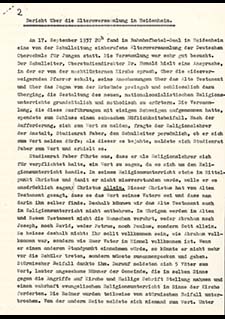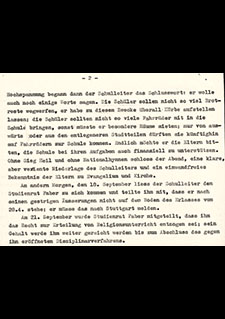The Fight for Religion Class
Although the Nazi state officially guaranteed denominational religion class at schools, it nonetheless increasingly attempted to reduce lessons and to eliminate all course content from religion class, which conflicted with Nazi ideology.
It had an easy time of it in regional churches governed by German Christians, such as in Thuringia in particular. The Old Testament had already been cut from curricula there in 1936. When the new Thuringian curricula were introduced, the superintendent of Hildburghausen schools recommended using the anti-Semitic tabloid “Der Stürmer” instead, which could help impress upon children that the Jewish people had not changed in any way in 2,000 years. A handbook for religion and confirmation class “Ein Reich – ein Gott! Vom Wesen deutschen Christentums” (One Reich– One God! On the Nature of German Christianity) published by Hugo Rönck, a regional youth pastor, in 1938 also included individual issues of “Der Stürmer” as teaching material.
The state and party used teachers, to whom in Mecklenburg for instance leaving the church was suggested, as another lever to exert influence on religion class. Withdrawals in individual village schools led to a complete discontinuation of religion class.
Things went differently in Württemberg where the regional church was affiliated with the Confessing Church. Once the ministry of education had succeeded in eliminating denominational schools and introducing non-denominational schools everywhere, Minister of Education Christian Mergenthaler set his sights on course content, teachers and parents in order to uproot denominational religion class.
In a decree of April 28, 1937, he ordered that German youth had to receive an education standardized in the spirit of National Socialism. Accordingly, all materials had to be eliminated from religion class, which conflicted with the Germanic race’s sense of propriety, especially certain parts of the Old Testament. Mergenthaler additionally demanded that pastors who taught religion class at public schools take an oath of loyalty with which they were supposed to pledge obedience to Hitler.
Mergenthaler’s directives not only led to numerous protests from the Württemberg church government but also brought pastors, teachers and parents in serious moral conflicts. 700 pastors lost the right to teach religion class because they were willing to take the oath only when their ordination vows had precedence.
Johannes Friedrich Faber, the high school religion teacher in Heidenheim, lost his job after he had declared his belief in the Old Testament at a parent assembly and additionally stated that if he were to adopt another position, then he could no longer appear before the students but would have to pack up and leave instead. Many parents at a parent assembly in Bernhausen left the hall when the senior superintendent of schools attacked the Old Testament and called them enemies of the state.
In many places, parents took their children out of religion class because the Minister of Education’s directives imperiled Christian education. Mergenthaler responded by introducing a weltanschauung class for the children concerned. His ultimate failure to fully replace religion with weltanschauung class as he had planned was also the outcome of the perseverance of many parents, who – otherwise not critical of the regime by any means – objected in this point of ideological Gleichschaltung.
Source / title
- ©Landeskirchliches Archiv Stuttgart, D1/78


